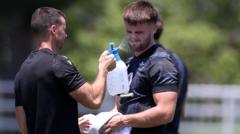Can Wales Overcome Challenges to Break Their Losing Streak?

An In-Depth Look at Wales' Summer Tour in Japan: Overcoming Heat and Humidity
The upcoming summer tour of Japan presents a significant challenge for the Wales rugby team. With the first Test match scheduled for 5 July at Mikuni World Stadium in Kitakyushu, the players will not only be facing a formidable opponent in Eddie Jones' Japan side but also the intense heat and humidity characteristic of the region during this time of year. As they prepare to end a 17-Test losing streak that dates back to October 2023, understanding the multifaceted challenges of this tour is crucial for both the players and the fans.
The Challenge of Extreme Weather Conditions
Wales' tour coincides with an extreme weather warning for the area, where temperatures can soar to around 33°C (91°F). The high humidity further complicates matters, making conditions feel hotter and more oppressive. Players will need to maintain peak performance levels under these challenging circumstances, especially since both matches are set to be played in the mid-afternoon. This poses a unique set of challenges, as fatigue can set in more quickly under such conditions.
Preparation Before Departing
Understanding the importance of acclimatization, Wales’ coaching staff initiated a rigorous training regimen even before the team embarked on their 6,000-mile journey to Japan. This preparation included:
- Grueling fitness sessions in heat chambers at their training base in Wales.
- Training with balls coated in washing-up liquid to simulate the slippery conditions expected during the matches.
Assistant coach Rhys Thomas emphasized that the comprehensive preparations were aimed at equipping the players to handle the extreme weather. “So it’s all been prepared for,” he stated, highlighting the focus on acclimatization before they arrived in Japan.
Adjusting to the Conditions
Upon arrival, the players were immediately confronted with the heat. Reports indicated that during a training session, the squad consumed an impressive 144 liters of water and 450 kg of ice, illustrating the importance of hydration in such extreme conditions. Each player was required to spend at least five minutes in one of the eight ice baths available on-site, with the volume of ice increased to 500 kg for subsequent sessions. This focus on hydration and cooling strategies showcases the team's commitment to performing at their best despite the challenging environment.
The Role of Nutrition and Recovery
Nutrition and recovery play pivotal roles in the team's strategy to combat the heat. Wales' strength and conditioning, nutrition, and medical staff have developed tailored plans to support player performance and recovery. These plans include:
- Utilizing heat packs and ice for recovery post-training.
- Implementing frequent hydration breaks during training and matches.
- Using specialized cooling equipment like soaking wet flannel hats and ice towels.
These strategies are vital for ensuring that players remain physically capable of competing at the highest level, especially considering the expected high-tempo style of play that Japan is likely to employ.
Historical Context and Previous Encounters
The rivalry between Wales and Japan has a rich history, with both teams showing remarkable resilience and skill on the field. However, Wales has not secured a win against Japan in their last 17 encounters, making this tour particularly significant. The experience of players like Josh Adams, who participated in the 2019 Rugby World Cup in Japan, could prove invaluable as they navigate the unique challenges of this tour.
Learning from Past Experiences
Wales' back row player Aaron Wainwright reflected on the importance of prior experiences in hot conditions, stating, “We had a tough training session on Tuesday. We had a couple of soaking wet, ice-cold flannel hats to put on and some ice towels and cold water bottles. Hopefully, that helps us recover.” This adaptability is crucial in a sport where environmental factors can significantly impact performance.
New Guidelines for Heat Management
In light of increasing awareness regarding player welfare, World Rugby updated its heat and air quality guidelines in 2025. These guidelines focus on a heat stress index, which determines the required interventions depending on the conditions on match day. This includes:
- Introducing water breaks at specific temperature thresholds.
- Extending halftime breaks or postponing matches if necessary.
Wales hopes to leverage these new guidelines to ensure player safety and performance. Thomas mentioned, “We’re hoping the strategy is going to go with heat restrictions almost in place, with a few breaks. We’ve been training for that accordingly.”
Adapting to the Game Strategy
Wales will face a Japan team that prides itself on a fast-paced style of rugby. Wainwright noted, “They want to play a fast style of rugby. They have a lot of strong and fast players in their backline, and it is up to us to stop their strong attacking threats from getting into the game.” This understanding of their opponent's strategy will be crucial for Wales as they look to impose their own game plan.
Strategies for Success Against Japan
To succeed against Japan, Wales will need to focus on several key areas:
- Defensive solidity: Ensuring that they effectively counter Japan's dynamic attacking style.
- Controlling the pace: Slowing down the game to manage the physical toll of the heat.
- Making smart decisions: Minimizing errors and maintaining composure in the face of fatigue and pressure.
As the match approaches, both teams will be keenly aware of how the heat and humidity will influence their strategies and performances. Thomas pointed out, “For both teams with the conditions, there are going to be lots of errors. It is how both sides adapt in the transitions which will have a big bearing on the result.”
Conclusion
The Wales rugby team is gearing up for a challenging yet exciting summer tour in Japan, where they will face not only a skilled opponent but also the daunting heat and humidity of the region. With extensive preparations in place, including acclimatization and strategic recovery measures, Wales is determined to end their lengthy losing streak.
As the players step onto the field, their ability to adapt to the conditions and execute their game plan will be vital. The anticipation for the first Test is palpable, and fans around the world will be watching closely to see if Wales can reclaim their strength on the international stage.
FAQs
What are the weather conditions expected during the Wales vs. Japan matches?
The matches are expected to be played in high temperatures around 33°C (91°F) with significant humidity, making conditions feel even hotter. Players will need to manage fatigue effectively.
How is Wales preparing for the heat in Japan?
Wales has undertaken rigorous heat acclimatization training, including sessions in heat chambers and hydration strategies. They are also employing cooling methods such as ice baths and ice towels.
What is the historical context of Wales' performance against Japan?
Wales has not won against Japan in their last 17 encounters, making this tour particularly significant as they aim to break that streak and regain confidence on the international stage.
As Wales prepares to tackle both Japan and the weather, will they be able to turn the tide and capture their first victory in over a year? #WalesRugby #RugbyTour #HeatChallenge
Published: 2025-07-01 13:04:21 | Category: wales



